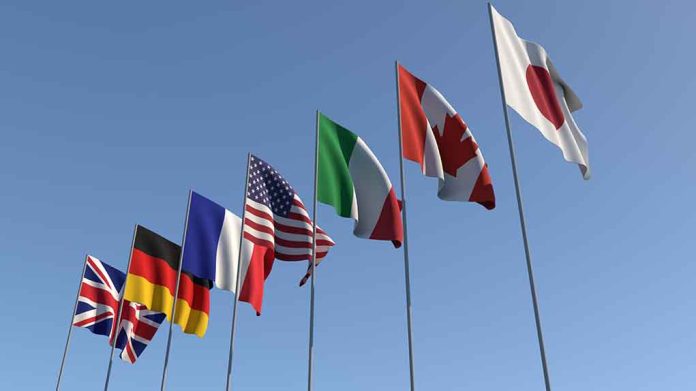
Amidst evolving geopolitical challenges, the G7 renews commitment to blocking Russian military sanction evasion.
At a Glance
- The G7 issued guidance to prevent export control and sanctions evasion by Russia.
- Guidelines focus on products vital to Russia’s military infrastructure.
- Industries urged to enhance compliance and due diligence initiatives.
- A Common High Priority List categorizes risk levels for key items.
G7’s Strategic Move
G7 representatives formalized their stance by releasing detailed guidance on September 24, 2024. This pivotal move focuses on fortifying export controls to deter Russia’s evasion of military sanctions. The core aspects of the guidance highlight items at high risk of being reexported to Russia. This includes the development of advanced weaponry and electronics components.
The guidance offers industries specific indicators to detect potential sanction-evasion attempts. Such red flags comprise sudden and unexplainable business changes, errors in documentation, convoluted shipping pathways, and irregular payment processes. The urging of best practice measures solidifies the resolve of the G7 in teaching industries to diligently screen transactions.
The Common High Priority List
A notable tool, the Common High Priority List (CHPL), is introduced. CHPL strategically categorizes items into four tiers based on value and susceptibility, with Tier 1 containing items such as electronic integrated circuits critical to advanced weapons. These circuits have limited suppliers globally, further emphasizing the necessity of rigorous export control enforcement.
“Preventing Russia from obtaining the components it needs to power its deadly missiles and UAVs is a top priority for G7 members,” said Assistant Secretary for Export Enforcement Matthew S. Axelrod. “But the G7’s anti-diversion efforts cannot succeed without the partnership of industry, which is why we today issued our first-ever guidance document designed to provide industry across the G7 the information necessary to identify and respond to Russia’s changing evasion tactics,” said Matthew S. Axelrod.
Additionally, the list serves as a framework for businesses to abide by the guidelines, ensuring vital components do not unwittingly fuel Russia’s military ambitions. Enhanced industry cooperation is pivotal for aligning with G7’s export control mission.
Global Alliance Against Evasion
The G7’s collaborations with the Global Export Control Coalition, comprising 39 nations, further exemplify the unified global effort against sanction evasion. The G7’s Sub-Working Group on Export Control Enforcement, formed in September 2023, leads these initiatives. The group conducts analyses and formulates communication efforts to thwart evasion attempts.
Efforts are ongoing to streamline messages across industries regarding Russian evasion tactics. The group’s first joint guidance aims to enhance detection and prevention methods. The guidance also mitigates reputational and liability risks for businesses adhering to international compliance standards.
















